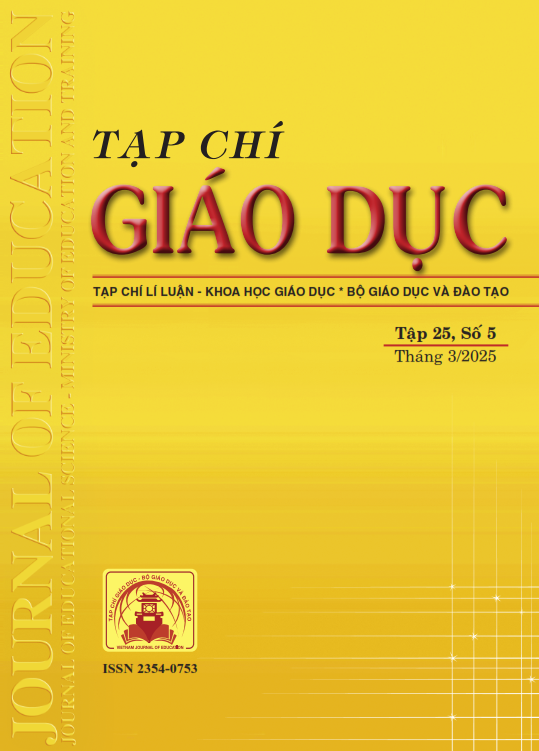Tổng quan các khung lí thuyết để nghiên cứu về phát triển chuyên môn của giáo viên tiếng Anh
Tóm tắt
In today’s educational context, teachers’ professional development has become a key factor in responding to rapid changes in curriculum, pedagogy and educational technology. Particularly in the field of English language teaching - a global and ever-changing field, teachers need to enhance their knowledge and skills to improve the teaching quality and meet the diverse needs of learners. This paper introduces four theoretical frameworks commonly used in the field of English language teaching to study teachers' professional development, including Historical-Cultural Activity Theory, Ecological Systems Theory, Contextual Learning Theory, and Community of Practice Theory. Specifically, this paper examines the basic principles and practical applications of these theoretical frameworks, explaining in detail how they can be effectively applied to study and improve teachers' professional development. This study provides a theoretical foundation for future research on teachers' professional development in the field of English language teaching.
Tài liệu tham khảo
Azaza, M., Litz, D., & Hourani, R. B. (2023). Investigating teacher professional learning in a context of change: A UAE case study. Leadership and Policy in Schools, 22(1), 1-29. https://doi.org/10.1080/15700763.2021.1879166
Bronfenbrenner, U. (1979). The ecology of human development: Experiments by nature and design. Harvard University Press.
Cirocki, A., Farrelly, R., & Buchanan, H. (2023). Continuing professional development of TESOL practitioners: A global landscape. Springer.
Crawford, M. (2020). Ecological systems theory: Exploring the development of the theoretical framework. Journal of Public Health Issues and Practices, 4(2), 170. https://doi.org/10.33790/jphip1100170
Dau, D. L. (2020). Professional development of EFL lecturers in Vietnam: A cultural-historical activity theory perspective. https://researchdirect.westernsydney.edu.au/islandora/object/uws%3A57654
Day, C. (1999). Developing teachers: The challenges of lifelong learning. Taylor & Francis.
Dhanavel, S. P. (2022). Continuing professional development of English language teachers: Perspectives and practices from India. Springer.
Díaz-Maggioli, G. (2003). Professional development for language teachers. English Teaching Forum, 41(2), 1-9.
Dunne, F., & Honts, F. (1998). That Group Really Makes Me Think!” Critical Friends Groups and the Development of Reflective Practitioners. American Educational Research Association annual conference. San Diego, CA.
Engeström, Y. (2001). Expansive learning at work: Toward an activity theoretical reconceptualization. Journal of Education and Work, 14(1), 133-156. https://doi.org/10.1080/13639080123238
Foot, K. A. (2014). Cultural-historical activity theory: Exploring a theory to inform practice and research. Journal of Human Behavior in the Social Environment, 24(3), 329-347.
Freeman, D., Katz, A., Gomez, P., & Burns, A. (2015). English-for-teaching: Rethinking teacher proficiency in the classroom. ELT Journal, 69(2), 129-139. https://doi.org/10.1093/elt/ccu074
Grant, C., & Osanloo, A. (2014). Understanding, selecting, and integrating a theoretical framework in dissertation research: Creating the blueprint for your “house”. Administrative Issues Journal, 4(2), 12-26.
Hayes, K. N., Preminger, L., & Bae, C. L. (2024). Why does teacher learning vary in professional development? Accounting for organisational conditions. Professional Development in Education, 50(1), 108-128. https://doi.org/10.1080/19415257.2023.2283433
Jenlink, P. M. (2013). Cultural-historical activity theory. In B. Irby, G. H. Brown, R. Lara-Aiecio, & S. A. Jackson (Eds.), The handbook of educational theories. Information Age Publishing.
Lave, J., & Wenger, E. (1991). Situated learning: Legitimate peripheral participation. Cambridge University Press.
Li, X., & Xu, J. (2023). Understanding tertiary EFL teacher learning and identity development: A cultural-historical activity theory perspective. Porta Linguarum, 9, 251-271. https://doi.org/10.30827/portalin.vi2023c.29652
Mandl, H., & Kopp, B. (2005). Situated learning: Theories and models. https://www.researchgate.net/publication/ 303862960
Martin, A., Rosas-Maldonado, M., Sepulveda-Escobar, P., & Alvear Aranha, E. (2024). An ecological analysis of novice EFL teacher professionalism during the COVID-19 pandemic. Professional Development in Education, 1-18. https://doi.org/10.1080/19415257.2024.2436450
Moorhead, M., Elliott, C. H., Listman, J. B., Milne, C. E., & Kapila, V. (2016). Professional development through situated learning techniques adapted with design-based research. In 2016 ASEE Annual Conference & Exposition.
Mpofu, N. (2024). Exploring Fulbright foreign language teaching assistants’ pedagogical growth in United States universities. The Journal for Transdisciplinary Research in Southern Africa, 20(1), 1-9. https://doi.org/10.4102/ td.v20i1.1392
Opfer, V. D., & Pedder, D. (2010). Benefits, status and effectiveness of continuous professional development for teachers in England. The Curriculum Journal, 21(4), 413-431. https://doi.org/10.1080/09585176.2010.529651
Richards, J. C. (2015). Key issues in language teaching. Cambridge University Press.
Sims, S., & Fletcher-Wood, H. (2021). Identifying the characteristics of effective teacher professional development: A critical review. School Effectiveness and School Improvement, 32(1), 47-63.
Starkov, V., & Zamir, S. (2024). The characteristics of community practice in a professional development unit for teachers during the COVID-19 pandemic. Social Sciences & Humanities Open, 10(1), 1-7. https://doi.org/ 10.1016/j.ssaho.2024.101030
Stein, D. (1998). Situated learning in adult education. ERIC Digest. Columbus, OH: ERIC Clearinghouse on Adult, Career, and Vocational Education. https://www.edpsycinteractive.org/files/sitadlted.html
Tran, N. H. (2016). Developing English teachers’ cultural competence in Vietnam. TESOL Quarterly, 50(4), 847-870. https://doi.org/10.1002/tesq.323
Vargas, E. G., Chiappe, A., & Durand, J. (2024). Reshaping education in the era of artificial intelligence: Insights from situated learning-related literature. Journal of Social Studies Education Research, 15(2), 1-28.
Tải xuống
Đã Xuất bản
Cách trích dẫn
Số
Chuyên mục
Giấy phép

Tác phẩm này được cấp phép theo Ghi nhận tác giả của Creative Commons Giấy phép quốc tế 4.0 .












